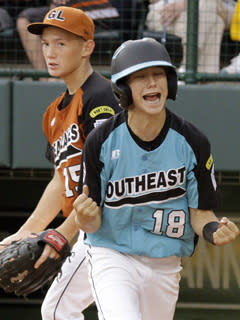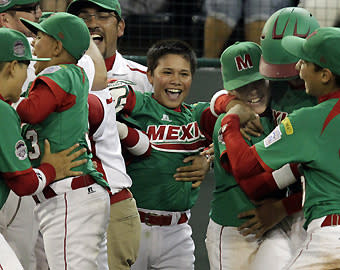Pay the Little League World Series players
Night after long summer night, here comes the beaming visions of Americana at its most wholesome – big corporate profits and the unpaid workers who deliver them.
Actually, it's the Little League World Series and, like nearly everyone else, I find little wrong with the Little League World Series. Who doesn't like watching a bunch of 12-year-olds play their hearts out and enjoy a fleeting bit of recognition? They've been staging the event since 1947, Norman Rockwell stuff.
Except that Little League became Big Business a long time ago, and while the concept is sure to shock and outrage (it has when I've written it in the past), the truth is it's long past time for a simple change.
The players should be paid.
Not every Little Leaguer, just the ones who play on television, where their innocence is packaged into a commodity. And, no, they shouldn't make millions or even hundreds of thousands.
They should get something, maybe several hundred per television appearance. If it made people more comfortable that the money went to a college savings fund or maybe into a trust that becomes available when they're 18 or 21, so be it.
Whatever it is, they deserve it because while the kids aren't making any money, everyone else associated with this booming, expanding event is.
What started humbly in bucolic South Williamsport, Pa., is now a marriage between the $38.1-billion Walt Disney Company (ESPN) and the "not-for-profit" Little League Baseball Inc. ($72.9 million in assets in fiscal 2009).
The two first masterfully figured out how to sell America on the purity of a game being played by unpaid kids.
Then they sold a lot of advertising.
The concept of amateurism only survives because they properly marketed this event as something it isn't completely about. Yes, players' passion, joy and youthful excitement drive it. That doesn't matter to the suits in the corner office, though. They aren't doing this out of the goodness of their hearts.
LLB did $22.1 million in total revenue in fiscal 2009, according to the most recently available federal tax form. It brought in $5.6 million from the World Series and an additional $3.7 million in "broadcast rights fees." ESPN continues to increase the hours it televises, up to 56 total games including regional finals and semifinals. The ratings are strong. This thing is a summer cash cow.
In fiscal 2008, LLB Inc. turned a $2.9 million (tax free) profit. Despite spending nearly $4 million on a construction project, it still turned over a $1 million in profit in 2009. It has that nearly $80 million in assets to fall back on.
Every player could be provided a stipend of, say, $750 every time their team appears on television – all 14 players per roster get the same amount. That would cost $1.18 million total. Most years, according to federal tax filings, that's less than half of Little League Baseball Inc.'s annual profits. They even could attempt to pass the cost onto ESPN, a do-the-right-thing fee.
It's a drop in the bucket to the executives. It's a big deal to the players and their families.
Disney has entire television networks and movie divisions filled with preteen actors, actresses, singers and dancers. It wouldn't dare think of not paying them.
Yes, the core of Little League springs from the humble neighborhood sandlot, and that's great. Anyone appearing on the Disney Channel can also take part in a community theatre program or school choir. When they get to the big time, however, they get paid for their talents.
No one says the adolescent actress on a Disney tweener show should be content enjoying the dream-come-true-experience of starring in a television show without compensation. No one says she doesn’t deserve to get paid because a million other kids her age would gladly do it for free or because she gets a nice hotel room and free ice cream in her trailer during shooting.
She's the star because she's talented. She's making money for the network, therefore she is a paid employee. Little League players reached the World Series for the same reason.
There is no shortage of American families that could use the money to save for college or offset the considerable costs of their son advancing through several tournaments to reach the Little League World Series. It's even more expensive for the foreign players and their families.
The last few weeks the Walt Disney Company made money off dozens of kids from third-world countries and didn't pay them a cent. I'm not sure this could occur in any other industry.
You think a few thousand dollars (each team gets at least two games on TV) might matter to families from Venezuela or Mexico, let alone blue collar America?
Money, some will argue, would change the event.
Perhaps, but change it for whom? Spare us the paternalism. The decision shouldn't rest on what most pleases the person watching from home or the one delivering the product to them (in between Kellogg's commercials, of course).
As for money leading to corruption, that ship sailed. There have already been myriad cheating scandals in Little League and the intensity of the competition long ago left the participation trophy level.
Would giving the players something for their efforts jeopardize future NCAA scholarships? Only if you believe in tail-wag-the-dog-nonsense. Since when should the NCAA get to be the final arbiter on this? Make them conform, not the other way around.
The Little League runs a wonderful event. They treat the players extremely well during their stay in Williamsport. Executive salaries are high, but are limited to a handful of employees and not wholly out of line for such an organization, which obviously does more than just run the World Series. Most Little League administrators and coaches around the world are volunteers.
In the multi-billion dollar youth sports industry that too often challenges families with endless expenses and tournament operators seeking maximum profits, it remains a shining light. It's also a lot of fun.
Which doesn't change the reality that it's become so big, so profitable, so commercialized, that the terms of the deal need to change along with it.
Little League Baseball is operating and Disney is broadcasting an entertainment product no different than Pirates of the Caribbean or Dancing with the Stars or Yankees-Red Sox. You can fall for their finely tuned marketing campaign emphasizing innocence and purity or you can follow the money right to their hefty bottom line.
These performers, no matter how poor they are back home, don't get paid. Not even a little.
Is that really what Apple Pie America is about?
Other popular stories on Yahoo! Sports:
• Little Leaguers do 'earthquake' celebration
• Jered Weaver chooses comforts of home, Angels
• Yankee plans honeymoon in Afghanistan
[Let your friends know which Little League team you're cheering for with IntoNow from Yahoo! for iPhone or Android!]

